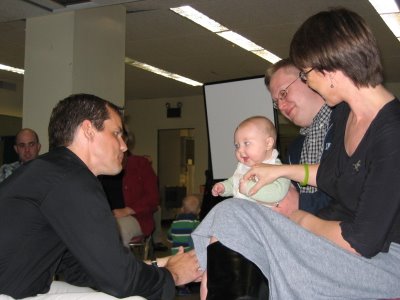Like so many others have done on occasion, I am taking a blogging hiatus. Not because I'm tired of blogging, or because I'm too busy doing other stuff to blog (although this is certainly true), but because it's almost November.
Monday, October 30, 2006
hiatus
Like so many others have done on occasion, I am taking a blogging hiatus. Not because I'm tired of blogging, or because I'm too busy doing other stuff to blog (although this is certainly true), but because it's almost November.
life bearing
 This week I got to talk about the spirituality of childbirth with a new friend who's doing a project on this for a class. What I found out, as she interviewed me about my experience of being pregnant and giving birth, is that while I experienced it as deeply spiritual, I didn't, necessarily, experience it as Christian in any obvious external way. Maybe it's just that I'm a bad Christian, but I don't think so.
This week I got to talk about the spirituality of childbirth with a new friend who's doing a project on this for a class. What I found out, as she interviewed me about my experience of being pregnant and giving birth, is that while I experienced it as deeply spiritual, I didn't, necessarily, experience it as Christian in any obvious external way. Maybe it's just that I'm a bad Christian, but I don't think so.Perhaps surprisingly, I didn't theologize a lot about what it meant to be pregnant. It wasn't something I wanted to thematize, or abstract from. It was something to cherish experiencing, and so I spent most of it just trying to be in the moment. Writing little notes to Clare in her little purple journal while she was born was part of that, I think.
One theological thing that I did find myself with was a much more concrete conviction that God is a God of life. Instead of being a principle enshrined in a theological system, suddenly, God as a God of life was concretely located in the ever-growing massive space between my ribs and my pelvis, kicking and wriggling and declaring her living goodness. I was in awe of the process, in awe of my own body, and hers, and in awe of the resilient fragility of it all.
For comps, I read an essay by Rahner, anthologized in the Theological Investigations, that discussed childbearing as absolute risktaking. That struck a chord with me, being about 6 weeks pregnant at the time, when everything was still a huge unknown waiting to happen. Rahner argued that childbearing must have this character. I remember thinking as I read it that really, this is simply an instance of life where life's true character as risktaking is more evident than it is day-to-day. Life is risk. It takes faith to negotiate it, and to bear it.

Sunday, October 22, 2006
yoga kitty
Thursday, October 19, 2006
prolegomena, or, The Question,
Or, "Good card players! But mind you, I wouldn't give them the time of day!"
It used to be that people used to ask me, "What are you going to do with that?" when I told them I studied theology. I used to tell them, "Have babies with it." I enjoyed the irony that went straight over people's heads when I said it. This left me amused, and them undisturbed, which worked for everybody. It annoyed Brent, though, since no one ever got that I was being facetious. And eventually I stopped. But that doesn't happen so much anymore. Nowadays The Question has become, "why are you still Church of Christ?"
I've blogged about this before, done the tag thing, and so on. But I'm never really satisfied with anything that I've written on it. Nothing ever seems to really get at the heart of why I remain where I am, despite, well, you know, not being given the time of day. So to speak. (Name that quote? Anybody? Anybody not related to me, I mean?)
It hit me forcefully this week (again, I blog under the influence of TH 222 and a bit of sleep deprivation; Clare's temporarily abandoned her habit of sleeping through the night) that part of a theologian's responsibility--before they start theologizing--is choosing to whom and for whom they speak. Where to locate themselves. Am I speaking to the church? The academy? In the public square? What issues to address? Whose issues to address. This matter of prolegomena is prior even to considerations of method, the prolegomena that gets discussed in the classroom.
Some of this is determined for you. But it is also, I'm convinced, a matter of careful, deliberate and responsible choosing. Who do I speak to. Who do I speak for. This should not be a casual decision, or a ceding to the inevitable. There's nothing inevitable about it. Sure, I'm a white middle-class chick from Tennessee. But that doesn't lock me into anything.
So, why am I still Church of Christ? Because I choose to be. Because these are the people I choose to speak to. And, in some sense, these are the people I choose to speak for: that is, the people in our short denominational history and in our churches who have been left out and turned aside, who have had to look in from the outside and look on in silence, who have assumed this is how it's supposed to be, or who have chafed under the knowledge that it isn't, for years.
You're responsible for choosing where to be, and for when and to whom you speak, as well as for what you say.
It used to be that people used to ask me, "What are you going to do with that?" when I told them I studied theology. I used to tell them, "Have babies with it." I enjoyed the irony that went straight over people's heads when I said it. This left me amused, and them undisturbed, which worked for everybody. It annoyed Brent, though, since no one ever got that I was being facetious. And eventually I stopped. But that doesn't happen so much anymore. Nowadays The Question has become, "why are you still Church of Christ?"
I've blogged about this before, done the tag thing, and so on. But I'm never really satisfied with anything that I've written on it. Nothing ever seems to really get at the heart of why I remain where I am, despite, well, you know, not being given the time of day. So to speak. (Name that quote? Anybody? Anybody not related to me, I mean?)
It hit me forcefully this week (again, I blog under the influence of TH 222 and a bit of sleep deprivation; Clare's temporarily abandoned her habit of sleeping through the night) that part of a theologian's responsibility--before they start theologizing--is choosing to whom and for whom they speak. Where to locate themselves. Am I speaking to the church? The academy? In the public square? What issues to address? Whose issues to address. This matter of prolegomena is prior even to considerations of method, the prolegomena that gets discussed in the classroom.
Some of this is determined for you. But it is also, I'm convinced, a matter of careful, deliberate and responsible choosing. Who do I speak to. Who do I speak for. This should not be a casual decision, or a ceding to the inevitable. There's nothing inevitable about it. Sure, I'm a white middle-class chick from Tennessee. But that doesn't lock me into anything.
So, why am I still Church of Christ? Because I choose to be. Because these are the people I choose to speak to. And, in some sense, these are the people I choose to speak for: that is, the people in our short denominational history and in our churches who have been left out and turned aside, who have had to look in from the outside and look on in silence, who have assumed this is how it's supposed to be, or who have chafed under the knowledge that it isn't, for years.
You're responsible for choosing where to be, and for when and to whom you speak, as well as for what you say.
Monday, October 16, 2006
 This Sunday was Clare's dedication service at Christ's Church for Brooklyn. That's Joe anointing Clare's foot with some extremely fragrant "sweet-smelling stuff" (in fact, she's still smelling pretty sweet, which is great since, you know, babies don't really smell that sweet very often or very long) while Clare giggles right on cue. Isn't that an awesome picture?
This Sunday was Clare's dedication service at Christ's Church for Brooklyn. That's Joe anointing Clare's foot with some extremely fragrant "sweet-smelling stuff" (in fact, she's still smelling pretty sweet, which is great since, you know, babies don't really smell that sweet very often or very long) while Clare giggles right on cue. Isn't that an awesome picture?I loved the Thanksgiving service at Trinity, and found it really meaningful that Brent's mom could be there, that some members Brent knows pretty well stayed after church to attend, and that Anne Marie celebrated it. But perhaps because I am still an "outsider" to Trinity and to the Episcopal Church, the Thanksgiving service was, for me, a theological declaration more than a communal celebration. It was speaking to God about Clare; expressing gratitude, asking for wisdom for ourselves as we raise her, asking for God's blessing in her life. But last night's service, while still doing these things, was so much more about the community. Last night, we were a family unit, but we were also part of a larger community of faith. Last night, Clare was our daughter, but she was everyone else's child, too.
I'm not saying these thoughts were missing from our first thanksgiving, but that I experienced it very differently. Part of the difference is me, and part of it is the rite itself.
But mostly, I am so happy to be able to say to my daughter, you are a child of God, and you belong in any family of God you find yourself in: at Trinity, at CCfB...at St. Barnabas, at Manhattan, at Enumclaw Community Church...
Thursday, October 12, 2006
the flash
Every so often, something clicks in my head and things come together in a beautiful, crystalline way. It generally happens randomly, sparked by something read casually or spoken by someone else. I don't really understand how my brain works or why old bits of things float around in it unnoticed to eventually bump into something at the forefront of my consciousness and suddenly crystallize. But it happens that way.
So, the other day, I was sitting in 222 lecture (this being pretty much my primary out-of-the-house activity, second only to precepting; grocery shopping is a close third, and that is pretty much the sum of my out-of-the-house activity for a normal week) and something, I don't know what, suddenly flashed on in my brain. So at the end of my lecture notes, there is a squiggly box and in it I scribbled: Haraway--solidarity not similarity--answer to Xological problem.
So, I've been reading all this stuff, Barth, Calvin, Schleiermacher, on why Christ has to be both God and "Man" in order to do the work of redemption. Because how can Christ be our Mediator if he does not share in both natures?
Well...if Haraway's clue from feminist theory is worth anything, then maybe we can skip the whole Chalcedonian problem. Solidarity, not similarity. Does God have to be ontologically us to do the work of redemption? Maybe not. Maybe "mediation" isn't the way to think about it. Perhaps we can simply consider the incarnation, the crucifixion, the resurrection God's act of sovereign solidarity with us, despite our ontological difference. I don't know how far I would want to systematize that--probably not too far, actually--but it certainly is a relief from the wrestling with the God-Man question. And, incidentally, solidarity-not-similarity would provide an answer to the "problem" of Jesus' maleness.
So, the other day, I was sitting in 222 lecture (this being pretty much my primary out-of-the-house activity, second only to precepting; grocery shopping is a close third, and that is pretty much the sum of my out-of-the-house activity for a normal week) and something, I don't know what, suddenly flashed on in my brain. So at the end of my lecture notes, there is a squiggly box and in it I scribbled: Haraway--solidarity not similarity--answer to Xological problem.
So, I've been reading all this stuff, Barth, Calvin, Schleiermacher, on why Christ has to be both God and "Man" in order to do the work of redemption. Because how can Christ be our Mediator if he does not share in both natures?
Well...if Haraway's clue from feminist theory is worth anything, then maybe we can skip the whole Chalcedonian problem. Solidarity, not similarity. Does God have to be ontologically us to do the work of redemption? Maybe not. Maybe "mediation" isn't the way to think about it. Perhaps we can simply consider the incarnation, the crucifixion, the resurrection God's act of sovereign solidarity with us, despite our ontological difference. I don't know how far I would want to systematize that--probably not too far, actually--but it certainly is a relief from the wrestling with the God-Man question. And, incidentally, solidarity-not-similarity would provide an answer to the "problem" of Jesus' maleness.
Wednesday, October 11, 2006
Tuesday, October 10, 2006
Nana's blue dress
Saturday, October 07, 2006
WWJD
I used to spend down time during first year Greek at Harding making up alternative meanings for the WWJD acronym. Wild Women Joke Dirty was one. Wet Willies Jiggle Dangerously. Willie Wonka Jives Deliciously. I think MTR was implicated in this as well but now that it's nearly a whole screaming decade ago, my memory's a little fuzzy. Or maybe it's just that my little gray cells are already multitasking to capacity these days and have no spare energy for frivolity.
Anyhow, my mom's been blogging lately on the shortcomings of the WWJD impulse. This week as I was reviewing Tillich in preparation for Friday morning's precept I came across a lovely passage which speaks directly to the concerns my mom is expressing. Full of joy that reading old dead German guys can still be relevant to the task of theologizing today, I include the passage below:
"Imitatio Christi is often understood as the attempt to transform one's life into a copy of the life of Jesus, including the concrete traits of the biblical picture. But this contradicts the meaning of those traits as parts of his being within the picture of Jesus the Christ. These traits are supposed to make translucent the New Being, which is his being. As such, they point beyond their contingent character and are not instances to imitate. If they are used this way, they lose their transparency and become ritualistic or ascetic prescriptions. If the word "imitation" is used at all in this context, it should indicate that we, in our concreteness, are asked to participate in the New Being and to be transformed by it, not beyond, but within, the contingencies of our life." Systematic Theology II, 122-3.
Anyhow, my mom's been blogging lately on the shortcomings of the WWJD impulse. This week as I was reviewing Tillich in preparation for Friday morning's precept I came across a lovely passage which speaks directly to the concerns my mom is expressing. Full of joy that reading old dead German guys can still be relevant to the task of theologizing today, I include the passage below:
"Imitatio Christi is often understood as the attempt to transform one's life into a copy of the life of Jesus, including the concrete traits of the biblical picture. But this contradicts the meaning of those traits as parts of his being within the picture of Jesus the Christ. These traits are supposed to make translucent the New Being, which is his being. As such, they point beyond their contingent character and are not instances to imitate. If they are used this way, they lose their transparency and become ritualistic or ascetic prescriptions. If the word "imitation" is used at all in this context, it should indicate that we, in our concreteness, are asked to participate in the New Being and to be transformed by it, not beyond, but within, the contingencies of our life." Systematic Theology II, 122-3.
Subscribe to:
Comments (Atom)






